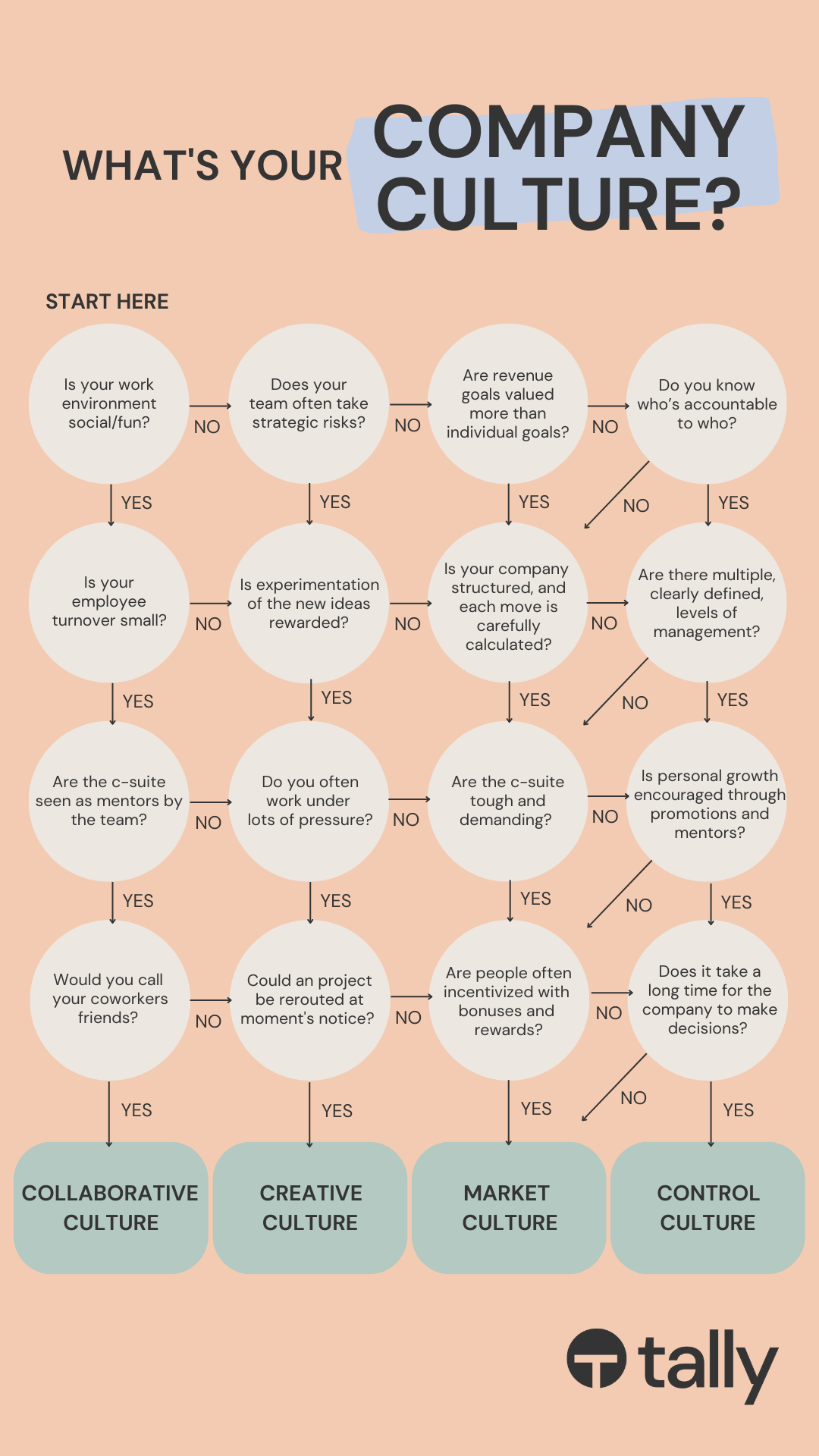We'll make it easy for you - company culture describes how things are done in the workplace.
The experience that both your employees and customers have is the consequence of a combination of official and informal procedures, attitudes, and beliefs.
There are 4 main types of company culture:
- Collaborative Culture
- Creative Culture
- Market Culture
- Control Culture

Collaborative culture
All of the employees are friendly with their coworkers and would consider each other friends outside of the work environment.
They often have a similar range of interests and hold similar worldviews.
An organisation with a clan culture tends to have long-term retention of its employees.
Consequently, some internal traditions at work emerge.
Customers are dependable, and relationships tend to endure.
Teamwork truly makes the dream work, as team tasks are way more common than individual tasks in a collaborative environment.
New hires are mentored by more seasoned employees (not simply those in management) in order to advance and realise their full potential.
Everyone is treated with respect, given the chance to engage, and given the option to offer comments and ideas.
The structure tends to not include many layers of management and is more outlined.
This is the most friendly, upbeat culture there is and is made up of employees who have a lot in common with each other.
Along with putting a lot of importance on the well-being of employees, making and keeping a good business culture is always a top priority.
Examples of companies that have a clan culture include Ben and Jerry’s, Google and Pixar.
Creative culture
It is the most inventive kind of culture.
Everyone is expected to be creative and should continuously be trying out new concepts.
Such a culture is beneficial in fields like technology or disruptive businesses, where taking chances can result in enormous rewards.
Creative cultures place a strong emphasis on business expansion and quickly launching new goods and services.
Businesses, as well as their own offers, are always evolving.
Employees are innovative and willing to take risks.
Perfectionism and adherence to the law are less crucial than learning from errors and changing.
The place of work is very dynamic, creative, and fast-paced.
Culture leaders in an adhocracy are real entrepreneurs who always encourage taking risks and getting people to try out new ideas.
In an adhocracy culture, people are used to quickly adapting to new situations, which lets them react to and focus on the most recent developments.
Examples of companies that have a creative culture include Tesla, Facebook and Apple.
Market culture
It first became popular back in the 1960s, is brutal, intensely results-driven, and performance-oriented.
Leaders are harsh and demanding, encouraging their teams to set challenging goals and work hard to attain them.
Businesses with this kind of corporate culture want to rule the entire market.
Instead of focusing on a single person's achievements, leadership evaluates success based on profit and market share.
All choices are predicated on what will move the company closer to achieving these two objectives.
Every single action taken by a company with this culture is well thought out and intentional.
Market culture businesses are unlikely to develop by accident, everyone is called to be dedicated to guaranteeing constant quality in goods and services.
Additionally, huge bonuses and other financial incentives are frequently used to motivate personnel.
Since businesses with market culture tend to attract competitive employees, it is common for workers to be high performers and strive to be the best among their coworkers.
Less emphasis is placed on teamwork and the local community and more is placed on the company's bottom line and financial success.
Examples of companies that have a market culture include Ford, Amazon and Apple under Steve Jobs.
Control culture
There are different degrees of management, and there is a distinct distinction between workers and leaders.
In an organisation with a hierarchical culture, decisions are made at the top.
Making decisions requires significant thought, attention to detail, and analysis of what has previously worked to reduce risk.
Planning and assessment are actually highly stressed in each corporate activity.
A hierarchy culture is suitable for fields where safety or security are top priorities because of these qualities.
Because it gives clarity, control cultures tend to be popular and likeable among employees.
For instance, all employers have to do to get a promotion is to simply follow the rules, the procedures, and their obligations.
A control culture makes for good management since the staff is productive and effective.
Examples of companies that have a market culture include NASA, most political systems and the church.
No matter what your company culture is, we have a workspace that will fit it here at Tally Workspace.
Feel free to drop us a message at [email protected] or submit an enquiry, and we will help you find the perfect workspace solution.



